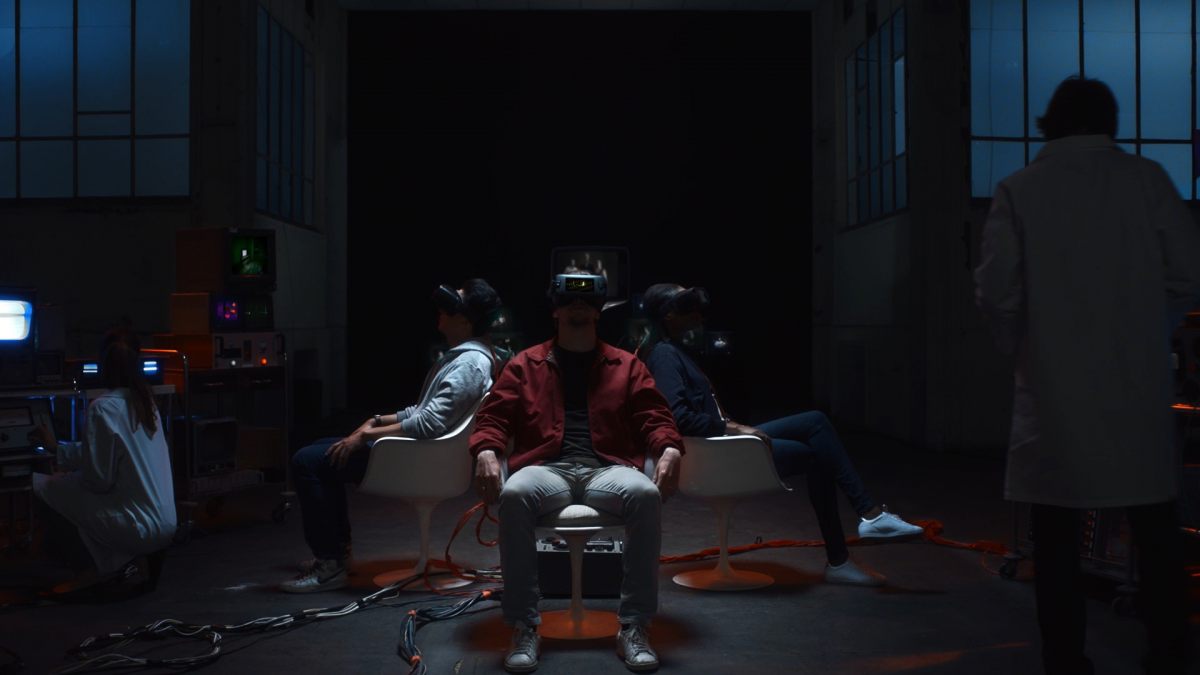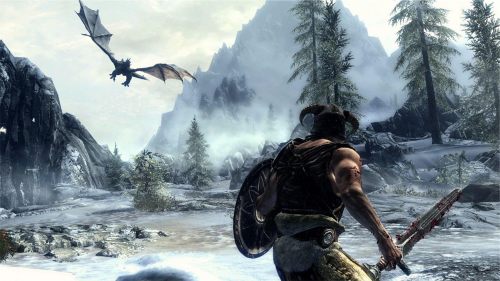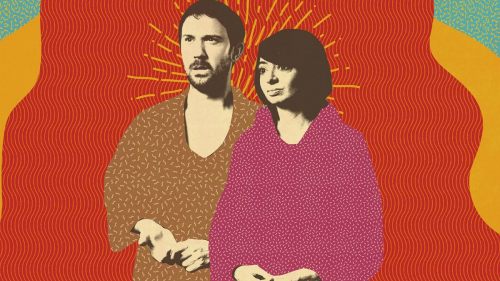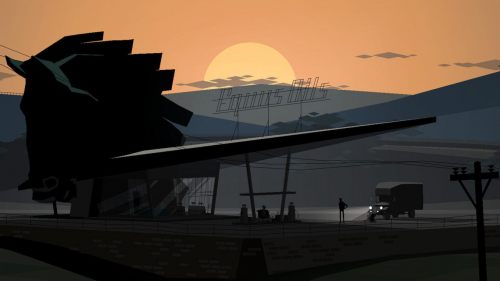SpectreVision’s Daniel Noah On TRANSFERENCE, VR, And Psychic Penetration
One of the most intriguing games to be revealed at E3 last week was Transference: a VR collaboration between SpectreVision (the company behind The Greasy Strangler, Open Windows, A Girl Walks Home Alone At Night, and more) and Ubisoft (one of the world’s largest video game studios). Its trailer was conceptual and vague, but promised untold depths of psychological weirdness and gameplay innovation. Having heard the folks from SpectreVision speak about VR at Fantasia Fest last year, I had an inkling of the broad creative goals of the project, and the E3 reveal only further piqued my interest.
With all that in mind, I naturally leapt at the chance to chat to talk to SpectreVision’s head of development Daniel Noah about Transference and the unique development process surrounding it.
BMD: What’s SpectreVision’s role in making Transference?
Daniel Noah, SpectreVision: The way that this has worked is quite unusual for the way a game is made. It is genuinely a collaboration between Ubisoft and SpectreVision. SpectreVision are acting as creative directors, and we’ve come together with the premise that SpectreVision is bringing its experience in storytelling and cinema, and Ubisoft is bringing their experience in game mechanics, and that we’re coming together to bridge that gap between two mediums and industries to create something in VR.
As we’ve grown to understand it better - and we spent a great deal of time just exploring and trying to understand the medium - we’ve arrived at the conclusion that VR is not cinema, and it’s not a game. In a strange way, it’s both and neither. And what we’ve been attempting to do is take the strongest elements of both mediums and put them together - into something that could work as a film, and could work as a straightforward 2D game, but works best in virtual reality.
What elements have you taken from those mediums to put into the game?
I keep thinking of this great story I heard once, about when Orson Welles was recruited by RKO to make a film. He was a huge star in theatre and in radio. And he said to them, “I’ll do it, but I want a year to research the medium before I commit to what project I’m doing. So they assigned him Gregg Toland, the DP, and Orson just kinda went to school. He wanted to understand every nuance of how film worked so that he could really reach for something great. And the result was Citizen Kane. Now, obviously, we should be so lucky to hold a candle to Citizen Kane, but as I always say, if you don’t aspire to greatness, you definitely won’t achieve it.
So we kinda did the same thing. We spent the first year of the process just having frequent meetings where our team would fly out to Montreal, or the Ubisoft team would fly out to LA, and we’d just talk to each other about how we did what we did, and about our beliefs about our respective mediums worked. Just educating each other. And they showed us all the VR stuff that they were developing, or things that other developers had in the works, or that had been released; we attended a lot of conferences, just absorbing what was going on. And in doing so, we arrived at certain conclusions.
What we’ve found is that the immersive quality of virtual reality is inherently cinematic. And as such, what drives a player - because it is a game - is not the typical stuff that drives a player in a video game. Typically it’s more of an intellectual engagement. It’s about scoring points, or killing bad guys, or hitting checkpoints, or collectibles - the feedback loop is somewhat primitive. In VR, the buttons that we’re able to push in a person’s psyche are far more evocative than the simple satisfaction of “I got the coin!”. It’s more emotional. In 2D gaming, the word I like to use is “primitive,” whereas in VR it’s more primal. It’s fear; it’s curiosity; it’s empathy. And what we’ve been trying to do is create a gameplay that is driven by emotional desires rather than intellectual desires, so that the player is thrust into this very evocative experience - the emotional aspects of it, the sensory aspects of it. It’s tactile. It’s immersive. And the “game” elements are story and emotion-based, rather than math and geography, which is what usually drives a game. So to answer your question, it’s
[A motorcycle pulls away outside.]
Sorry. Motorcycle. For some reason, the street where I live is favoured by motorcyclists. I’ve thought about putting a fishing line out on the street…
So I think, that’s taking the best of both mediums and putting them together.

Something that interests me about this project is the collaboration between you guys and Ubisoft, since the methodology of making games and movies is so different. How has that process been for you?
Unbelievably thrilling. We talk every day (not weekends). It’s been incredibly exciting and productive for both sides, because as I said, we’re kinda teaching each other how we do what we do. I like to harken back to what I call “the American Beauty effect,” which is that the most incisive satire about American culture was made by a man from the United Kingdom. Sometimes it takes an outsider to see things that people on the inside don’t see. And I think that’s been very true of our collaboration.
There have been things that we’ve brought to them, like “this is how we do it in film,” and they go, “well that doesn’t really make sense - you could do it like this,” and we go “holy shit! You’re right!”
And vice versa - there are conventions in game design that we look at and go, “that doesn’t make sense. Why do you do it like that?” And they go, “that’s just how we do it.” And we go, “well what about this?” and they go, “holy shit! I never thought about that before!”
So I think we’re challenging each other's habits and assumptions. There’s an amazing story about - I’m probably gonna get this wrong, because it’s like a game of telephone - about a group of monkeys in a lab. And there’s a ladder with a beautiful bunch of bananas at the top. And every time a monkey goes for the bananas, they get sprayed with a firehose. So they learn, after a while, just don’t go for the bananas. Generations pass, and it’s just generally understood that you do not reach for the bananas. And one day, one of the monkeys says, “you know, I gotta ask, why don’t we ever go for those bananas?” The other guy goes, “you know, we’ve just never gone for the bananas, and nobody knows why.” And he says, “well I’m going for them,” and he goes, and he gets the bananas.
I love that story, because it reminds us that just because we learned how to do something a certain way, doesn’t mean that it’s the best way. And for a bunch of filmmakers and a bunch of game designers coming together, we’ve been able to be those monkeys for each other. There’s been a great deal of that going back and forth. Almost on a daily basis, there’s this “a-ha” moment from one team or the other, and I think it’s resulting in something that is really unique.
Anything in particular that you can speak about?
I’ll give you two examples. For one: our very early concepts for the narrative for the game were met with the challenge of making it less linear and less directed. That’s a very good example going in that direction. In the other direction? I myself take a further degree of separation in that not only am I not a game developer, but I am not a gamer. The last time I played a video game was with a little red joystick on a Donkey Kong arcade machine in 1987. So there were certain questions that would come into my head, such as: why is every game basically the same, but with a different skin? Why is it all about shooting and swords, and all about checkpoints? You made it to Level 3 of the submarine! Now you have to go to Level 9! Surely there are other ways of structuring a game.
It's always interesting when people from other mediums jump into games. Josef Fares from Hazelight is a great example - Brothers: A Tale of Two Sons is just so different from most games, and I feel like it’s because he didn’t have those preconceptions.
Yeah! I love his stuff. I love Brothers. And I mean, David O’Reilly is obviously a real maverick in terms of thinking of new ways of even structuring a game experience, in a foundational way, rather than just reskinning them. And obviously games like Fez, that kind of mind-melting - although still a game of checkpoints, but the way you play with perspective. I agree with you. I think sometimes outsiders are the ones who break open a medium.

Was there a particular experience or demo that made you believe in VR?
I think it was more seeing VR and never thinking that it worked. What a lot of people tried to do early on - and I’m sure, had we been involved earlier in the development of this medium, we would’ve done the same - a lot of people tried to basically make short films. And we really arrived at the conclusion that that is not the optimal use of the medium. Certainly for documentary, it can be.
My point of view on this is: if I’m watching a film, I don’t want to be responsible for choosing the shots. I want Martin Scorsese to choose the shots. I want Claire Denis to choose the shots. There’s a reason that role is called “director.” They direct your perspective. If you’re directing your perspective yourself, in my opinion, it’s not a film. It’s a game. It’s interactive. We saw a lot of attempts to do what felt like very directed narratives that just didn’t feel right to us. So it became this puzzle that we wanted to solve. Clearly the potential of this medium is enormous, but no one seems to figure out how to use it properly. And that was what inspired us to go in the direction we ended up going for Transference.
All the press material, the trailer, and so on have been very vague and conceptual about what Transference actually is - can you bring any more clarity to that?
There’s a demo that they made available at E3. It takes about twenty minutes to get through. It’s actually a prelude to what the game will be. The demo will never be part of the game - it’ll never have a life outside of [gaming conventions]. But it is a prelude to a larger story. You could almost think of it as an appetiser or a prequel - it exists in the same narrative universe.
The game is still in development, and it’s probably too early to speak about it in any particular detail - not to mention I think the game works best if we don’t reveal what it is. But what I can tell you is that the premise of the demo is that you are walking through an uploaded memory of an event, from a patient in a research project who is experiencing post-traumatic stress disorder. You enter a digital recreation of his memory, and you are just left to your own devices to understand what it is you’re doing in there, and how things work. It has a very dreamlike quality to it.
What have been the major storytelling challenges in VR?
Rather than speaking to the challenges, I’d rather just speak to the solutions. Although I just got through saying “it takes the best parts of cinema and the best parts of gaming and combines them,” in many ways I’m growing to feel that VR has more to do with novels than it does with any other medium. Because of the immersive quality, because you’re in it, it lives very very deeply in the subconscious. There is no separation. When I sit on my couch and I play Horizon: Zero Dawn or Inside or Everything, I’m aware that I’m in my living room, I’m getting texts, eating Doritos - I don’t actually eat Doritos, but you get my point.
In VR, you are literally immersed. There’s no awareness of anything other than the environment that you’re in. And that’s how novels work. A novel lives inside you. And I think VR can penetrate people’s psyches in a way that external mediums cannot. And that’s very, very thrilling.

What kind of penetration are we talking about here?
It has the quality of a haunting dream. If you have a very powerful dream that seems to come from a deep place inside you, that dream can linger in your mind all day. You feel it on your skin, almost. You see it everywhere. It’s in the air you breathe, because it’s living inside you - it’s living in your psyche. And our hope is that we’ll be able to invoke a very similar experience. And we’ve been encouraged! Many, many people who’ve done the demo have given us the feedback that, you know, they think about it for quite a long time after doing it. It seems to get under people’s skin, which is what we hoped it would do.
What kind of techniques have you been using to create that kind of effect? I guess that’s as much a game design thing as it is a narrative thing.
I can’t speak to the Ubisoft side of it, in terms of the technical aspects. I’m just too ignorant to speak eloquently about that part of it. But from the creative side of it? It is not a directed experience. I like to think of it less as a narrative and more as an exhibition, where the player is free to wander about the environment and encounter information that, when pieced together, begins to suggest a narrative. But that information can be taken in in any order. It doesn’t matter what order it’s taken in. The player is telling the story in his or her own way, at his or her own pace, structured in the way he or she wants to structure it, based on what moves them, what they’re comfortable with, what moves them, what scares them, et cetera.
And this is a very direct answer to what I was complaining about earlier, with VR films, where my feeling tends to be, I don’t want to be responsible for this. I want someone better and more skilled than me to make these decisions. In a VR game such as the one we’re making, it is designed so that the player is the director. It is meant to function that way. So our job is to create an evocative environment, and to make sure that all the information is there for them to find, if they want to find it.
The demo can be played in many ways, and there are moments in it that some people miss, that they never see. There’s a great gag in it where there is, in fact, a character who is present in a room, who the vast majority of people never see, because they just never turn around. And I love that kind of thing, where you come out of it and it almost feels like it has a life. That there’s a character in the Transference demo who is there - he’s alive! Some people never notice him, but he’s seen them - he’s looked at the back of their head.
So as storytellers, your job is less to tell a conventional story than to put the material out there and take your foot off the narrative gas a little.
Definitely. Yeah. There’s not a clearly defined track for the player to be on. There isn’t meant to be. And what I can say about the game itself is that it is a multi-branching narrative, like a choose your own adventure story. There are many, many ways it can be played. There are many, many different outcomes that the player can cause. So the idea of agency and free will is very prominent in our game. It’s not a movie.
Based on what you’ve been telling me, I’m reminded a lot of games like Gone Home, which I’m sure you’ve been told a bunch. Was that a conscious inspiration in development?
Very much so, but in fact we wanted to use those tropes against the player. It starts out feeling very familiar, like Gone Home or Edith Finch, but it very quickly turns into something entirely different.

The marketing material has a lot to say about the team researching brain uploads and other concepts [including the work of Raymond Hayes]. How much of that is based in legit science?
It’s very legit. It’s all based in real science and real research.
Did you look into that area as a result of looking into VR? Or vice versa?
Our director of gaming and digital, Kyle McCullough, could speak much better to this aspect of it than me. I’m a dummy about this stuff. But yeah, he is extremely researched in tech and in virtual reality in particular.
We’ve had some meetings with some tech innovators who are developing VR for various usages that are quite stunning. One does start to realise how prevalent virtual reality is going to be in our culture in the future. Anything from running military exercises, or hypothetical scenarios - a terror attack in Washington DC, how would that play out; creating VR AIs that can respond to unlikely events, et cetera.
But in terms of the psychological aspect of it, there is research being done about ways in which VR might be used for therapeutic purposes. And that is what we’re leaning into here.
On that subject, you’re doing something that we don’t see much of in VR, which is using the headset itself as a physical instrument within the game.
Yeah! I can’t say with absolute certainty that no one has done this before, but to my knowledge, it is one of the first times, maybe the first, where the player is playing him or herself. Typically, when you play a game, whether it’s traditional console, or VR, you’re playing a knight, or an android, or a space explorer. There is no identity for the player in this game. They are thrown in as themselves, and I do believe that that is a big factor in the psychological design of Transference.
Since you’re dropping people into different consciousnesses, what are you able to communicate about those consciousnesses in Transference that you couldn’t in film?
I think it’s a lot of what we’ve talked about already. It’s the agency of, “you are the protagonist.” You’re not playing a character. It is a non-linear narrative experience. It is highly surreal. The premise that you are in someone else’s consciousness - to enter someone else’s subjective experience of being alive is shocking. They don’t see the world the way that we do.
More to the point, this is the psyche of someone who is not well. They have post-traumatic stress disorder. I think it’s an important distinction - you are entering their psyche. And all bets are off once you’re in there. It’s not clean, it’s not straightforward - it is dreamlike. Furthermore, one of the concepts of the demo is that the technology is still quite imperfect and glitchy. So what you experience in there is a very disorganised mind expressed through a very imperfect medium. And the results are very extreme.

Reminds me a bunch of Psychonauts, which I’m sure is another game that’s been fired back at you a lot.
It has, yeah.
But you’re obviously going for a much more intimate approach.
Much more intimate, and darker.
I’d expect as much from SpectreVision!
[laughs]
What kind of stories are you looking to tell, then?
All I’m at liberty to say right now is that the game will be an extension of the story that’s started in the demo, and suggested in the promo. Whereas in the demo you are in only one person’s consciousness, the game will allow you to encounter a family. It is multiple psyches mixed together. And that’s really all we’re saying at this point.
Well, this has all been super interesting - obviously I’d love to chat specifics, but I know how development schedules go…
Yeah! Thank you. I’m sorry to be so cloak and dagger about everything. We’re obviously so eager to finish this thing and get it out into the world. Hopefully it’s not too far off. We’re pretty hellbent on getting it out in spring 2018, and it does seem like there is a clear path to making that date.
And I should just mention - I’d be remiss if I didn’t - that it will be available on standard consoles as well as VR. It’s optimal in VR, and our desire is that that would be how people would experience it, but it absolutely works on a traditional platform. It doesn’t have the same immersive quality, and some of the psychological aspects of it that I described are slightly lessened, but it still functions.
Thanks for chatting - I’m really excited to see how it all plays out.



